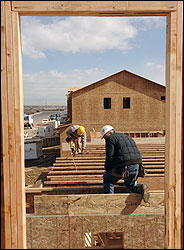My View From Las Vegas
Friday, April 29, 2005

Matthew Staver/Bloomberg News
A new house goes up in Littleton, Colo. Sales of new homes rose by 12.2 percent in March and hit a record annual pace of 1.43 million
April 27, 2005
Consumers Are Wary, but Housing Remains Hot
By EDMUND L. ANDREWS
WASHINGTON, April 26 - Consumer confidence fell in April, but the nation's housing market seems hotter than ever.
Confounding most forecasters, who had expected home sales to decline last month, the government reported on Tuesday that sales of new homes rose sharply by 12.2 percent in March and hit a record annual pace of 1.43 million.
The unexpected surge came despite slightly higher mortgage rates last month, worries about slowing growth and an escalating debate about a "housing bubble" in at least some regions that many specialists argue might be on the verge of bursting.
Analysts cautioned that the estimate of home sales might be revised down slightly as new data becomes available, and they noted that consumer confidence had been shaken since March by higher gasoline prices, sluggish employment growth and this month's swoon in the stock markets.
But despite scattered signs pointing to slower growth, the strong pace of home-buying is expected to reinforce the Federal Reserve's intention to keep raising interest rates until they have reached a level that no longer serves as a stimulus for growth. The central bank is expected to raise short-term rates by another quarter point next Tuesday, to 3 percent, which would be the eighth rate increase since last June.
The Conference Board reported on Tuesday that its index of consumer confidence dropped to 97.7 in April, from 103 in March, and expectations about the next six months dropped to their lowest level in nearly two years.
The decline, steeper than forecasters had predicted, comes on the heels of signs of sluggish retail sales.
"Looking ahead, consumers do not anticipate an improvement in economic growth nor in their incomes," reported Lynn Franco, director of the Conference Board's Consumer Research Center. And many people expect it to be harder to find a job over the summer months, he said.
But Fed officials have paid relatively little heed to recent data suggesting an economic slowdown, suggesting that they are more concerned about the danger of rising inflation.
Surveys of consumer confidence provide an erratic guide at best to consumer spending, because the surveys often reflect the bad news that people have already heard rather than what they actually plan to do in the months ahead.
By contrast, analysts said the startling rise in new-home sales suggested that the real estate market might continue its expansion despite price increases of 20 percent and more over the last year in many parts of California, Florida and along the East Coast.
"It still appears that it doesn't take much to generate faster home sales," said Peter E. Kretzmer, a senior economist at Bank of America. Indeed, Mr. Kretzmer predicted that the housing market might actually gain strength because long-term interest rates have edged down a bit since March.
The relentless rise of the housing market is a growing puzzle for central bankers. The Fed fueled a housing boom after 2001 by slashing interest rates to their lowest levels since the 1950's, which caused prices to soar and allowed millions of people to cash out some of the new equity in their homes and spend it on everything from kitchens to cars.
But even though the Fed has been raising short-term rates steadily since last June, the long-term interest rates that determine mortgage rates are still about as low today as they were one year ago.
Alan Greenspan, the Fed's chairman, told House lawmakers in February that the continued low level of long-term interest rates was a "conundrum" that he could not fully explain. Several economists have suggested that huge inflows of foreign savings into the government bond and mortgage markets have also played a significant role in keeping interest rates low.
And while Fed officials have argued that there is little danger of a national housing bubble, they have acknowledged concerns that low interest rates may have encouraged speculative buying by people who have unrealistic expectations about future price increases.
"Low interest rates, in turn, have been a major force driving the phenomenal run-up in residential real estate prices over the past few years," Donald L. Kohn, a Fed governor, said in a speech last week. Though he discounted worries about a crash in real estate prices, Mr. Kohn said that prices had climbed high enough to "raise questions" about an increase in speculative buying and overvaluations.
Analysts said part of last month's rush to buy homes probably reflected a race by people to complete deals before mortgage rates start to climb higher. But a growing number of Wall Street economists are convinced that a housing bubble is under way, at least in many parts of the country.
Housing starts declined precipitously last month, which may have reflected an expectation among builders that higher interest rates would stifle demand later in the year. But sales of existing homes climbed 1 percent in March and have climbed 4.9 percent over the last year, according to the National Association of Realtors.
"We think there is a bubble, and we think the risks are higher that it will burst," said Sheryl King, a senior economist at Merrill Lynch. "Even if you adjust for population growth, you're seeing numbers that are bigger than any we have seen at this point in any previous economic cycle."
Copyright 2005 The New York Times Company | Home | Privacy Policy | Search | Corrections | RSS | Help | Back to Top

